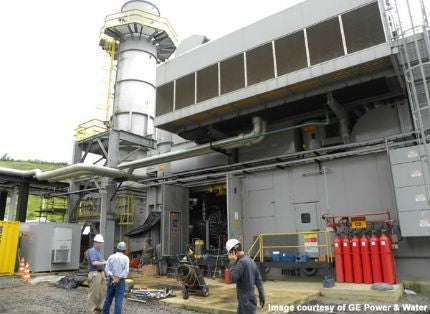

The world’s first commercial scale sugarcane-based ethanol power plant was built 180km north of Rio de Janeiro in the city of Juiz de Fora, in the Minas Gerais state of Brazil. The plant, built and operated by the state-owned company Petrobras, was launched on 19 January 2010. Technology, engineering and field support was provided by General Electric (GE).
The Ethanol power plant came into commercial operation through the conversion of an 87MW natural gas-fired power plant situated in the Juiz de Fora thermal power generation park. The power generation park has a total installed capacity of 7,028MW with 14 natural gas based, 12 oil fuelled and 15 hydroelectric power plants.
The 87MW plant is now using sugarcane-derived ethanol to produce power enough to meet electricity needs of around 150,000 people in Juiz de Fora. The power output of the plant is fed into Brazil’s electricity grid under a ten years power supply contract.
Conversion to ethanol-based operation
The thermoelectric plant which uses ethanol as its fuel source was originally based on a natural gas fired simple-cycle operation. It was equipped with two GE LM6000 aero-derived combustion turbines, and generators supplied by Alstom.
Petrobras wanted to utilise ethanol in the plant in its bid to use alternate fuel sources for power generation. It initiated a $25m project to convert one of the plant’s generating units (43.5MW) to an ethanol-fired unit.
The conversion project, executed by GE, involved replacing the combustion chambers and injector nozzles. Peripheral equipment such as a receipt system, tanks, pumps and filters were also installed as part of the conversion project. The turbine conversion, however, incorporated the flex-fuel provision (option to use natural gas as well) due to energy security and reliability reasons.
GE was awarded another contract in October 2010 for the plant’s second turbine conversion, after the first turbine was successfully converted for ethanol-based operation.
Demonstration testing of the ethanol fuelled Brazilian power plant
Related project
Belo Monte Hydroelectric Power Plant, Xingu River, Pará, Brazil
The 11,233MW Belo Monte hydroelectric power plant, located in the state of Pará, is a hydropower project that will help Brazil meet its increasing energy needs.
Before commissioning the new ethanol power plant, Petrobras, with the help of GE, conducted a demonstration test to confirm the validity of ethanol as a fuel source for power generation and to observe the emission levels of such an operation.
The demonstration, which was carried out in three phases, took five months to complete. The engine performance and environmental impact were evaluated in the first two phases, while the performance of the equipment when running on ethanol was investigated and examined in the third phase.
The testing was completed in May 2010 and no difference was found in turbine performance with the use of ethanol.
Environmental benefits of ethanol-fired power generation
The tests conducted at the ethanol-fired thermoelectric plant confirm lower CO2 emissions and water usage by the plant. In a 150-hour comparative test, it was observed that the ethanol-fired plant emits 30% lesser nitrogen oxide (Nox) than a typical natural gas fired plant.
Ethanol-fired power plants not only contribute to the reduction of greenhouse gas emissions but also perform at par with a natural gas or diesel-fired plant. Such a power plant also offers prospects of energy security as it uses ethanol derived from sugarcane, which is a renewable bio-fuel source.
Brazilian energy market and the prospects of ethanol
Brazil had an installed capacity of 106GW in 2009. The total power consumption during the year was about 67.4GW, with hydroelectricity accounting for 85% of it.
A plan is in place to double the power generation capacity by 2020, as demand for power grows. However, hydroelectric power generation cannot be solely relied on as it is highly seasonal.
Thermoelectric power generation from natural gas, petroleum products and coal sources in the country totalled 3.2GW in 2009.
Ethanol presents significant promise as a low-carbon alternative fuel for thermoelectric power generation in the country, with the successful commissioning of the ethanol-fired power plant.
Brazil is the world’s largest exporter and second largest producer of ethanol. It produced 26.9 billion litres of ethanol in 2008. Ethanol production in the country is based on large-scale sugarcane cultivation.



